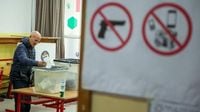On Sunday, October 12, 2025, citizens across Kosovo streamed into polling stations to cast their ballots in local elections that have drawn significant attention both domestically and internationally. According to The Washington Post and Abc, the elections took place against a backdrop of ongoing political tensions within Kosovo and strained relations with neighboring Serbia, underscoring the region’s delicate political climate. With about 2.1 million registered voters eligible to participate, the stakes were high as Kosovars selected mayors for 38 municipalities and approximately 1,000 local council members.
As the sun set and polling stations closed at 7 p.m., the streets of cities like Prishtina, Peja, and Prizren erupted in celebration. Supporters of various political parties waved flags, honked their car horns, sang, and even set off fireworks in anticipation of the first exit poll results. Yet, beneath the jubilant atmosphere, the early returns pointed to a competitive and fragmented field—one where most major municipalities, including the capital Prishtina, appeared headed for runoffs, as reported by local news outlets.
The race in Prishtina was particularly closely watched. Incumbent mayor Përparim Rama of the Democratic League of Kosovo (LDK) was leading as of about 50% of votes counted, but was expected to face a runoff with Hajrulla Çeku of the Vetëvendosje Movement (LVV), a party that has been making significant gains in recent national elections. This contest between Rama, the sitting mayor, and Çeku, a former culture minister, was emblematic of the broader political struggle playing out across the country.
Elsewhere, the Democratic Party of Kosovo (PDK) was anxiously awaiting the final tally in South Mitrovica, where with about 60% of votes counted, PDK’s Arian Tahiri and LVV’s Faton Peci—currently acting minister of agriculture—were separated by a razor-thin margin of just 1%. Exit polls, however, suggested a solid lead for Tahiri. In Ferizaj, the incumbent mayor Agim Aliu of PDK looked to have secured a first-round victory with 56.3% of the vote after 73% of ballots were counted, while in Drenas, Ramiz Lladrovci, running as an independent under the banner “For Drenas Champion,” was leading over the PDK candidate Petrit Hajdari—a result that surprised many observers.
Prizren, another major municipality, was also projected to head to a runoff between Shaqir Totaj of PDK and Artan Abrashi of LVV. Meanwhile, LDK celebrated wins in Lipjan and Istog, with around 90% of votes counted in Lipjan. The Central Election Commission (CEC) announced that runoffs would take place on November 9 in any municipality where no candidate secured more than 50% of the vote—a scenario that looked likely in many places based on early results.
Voter turnout, according to the CEC, was 39%—a figure that reflects both the challenges and the opportunities facing Kosovo’s democracy. Of the 2,069,098 registered voters, around 44,000 were eligible to vote from abroad. At a press conference on election night, PDK spokesperson Vlora Çitaku declared her party the winner of the local elections, stating, “PDK has won the most municipalities outright and leads in the greatest number heading to runoffs. It also received the largest share of votes overall.” She added, “The real winners are Kosovo’s citizens, who proved that democracy and political maturity are stronger than ever.”
Earlier in the day, Çitaku had expressed satisfaction with the level of citizen participation and noted the growing support for PDK. “In many municipalities, the reports we are receiving from the field are extremely positive. PDK is leading convincingly and with a clear lead, thanks to the work, dedication and trust of our citizens,” she said. She also urged those who had not yet voted to go to the polls before they closed, emphasizing, “Every vote counts for the future that we all want. PDK is winning the trust of Kosovo, once again.”
Acting Prime Minister Albin Kurti, leader of Vetëvendosje!, congratulated voters for their calm and responsible participation, writing on Facebook, “Kosovo’s citizens once again showed democratic culture by going through local elections responsibly. Now it’s the turn of commissioners and observers to count and protect every vote.” According to Abc, Kurti faces significant challenges ahead, having just been tasked with forming a new cabinet within fifteen days following the end of an eight-month political deadlock in Parliament. The other major parties have so far refused to enter coalition talks, leaving Kurti under pressure to stabilize domestic politics, address economic challenges, and revive EU-brokered normalization talks with Serbia.
The elections were also notable for the performance of Vetëvendosje!, which appeared close to securing first-round victories in municipalities such as Podujevë, Kamenicë, and Gjilan. In the Serb-majority north, the Belgrade-backed Srpska Lista led in most municipalities, including four northern areas previously run by Albanian mayors. American media emphasized that voting in these regions was particularly significant, given the ongoing deadlock in the EU-facilitated dialogue between Kosovo and Serbia—a process that has remained stalled since Kosovo declared independence in 2008, a move Serbia still refuses to recognize.
Security during the election process was robust, with the Kosovo Police reporting that their nationwide operational plan had been successfully implemented. “Thanks to strong institutional cooperation and responsible behavior by citizens, the entire election process proceeded calmly and without serious incidents,” the police stated. Only minor infractions were reported, including two cases of violation of voting secrecy and eleven instances of voters photographing their ballots. The prosecution noted that it had not arrested anyone for crimes violating voting rights.
Despite the generally smooth process, not all voters found the experience accessible. Voters with disabilities reported difficulties entering polling stations. In Fushë Kosova, Agim Pajaziti, who uses a wheelchair, was unable to vote because his polling station was located on the second floor of a school building. “This is unacceptable—a violation and exclusion of people with disabilities. I’m very disappointed because my vote has effectively been taken away,” Pajaziti said, highlighting ongoing challenges for inclusivity in Kosovo’s electoral process.
Beyond the numbers and party celebrations, the 2025 local elections in Kosovo reflect both the progress and the persistent challenges of a young democracy navigating complex internal dynamics and fraught international relations. As the country awaits the final results and prepares for likely runoffs, the spotlight remains on how political leaders will address the issues of governance, inclusion, and dialogue that continue to shape Kosovo’s future.





